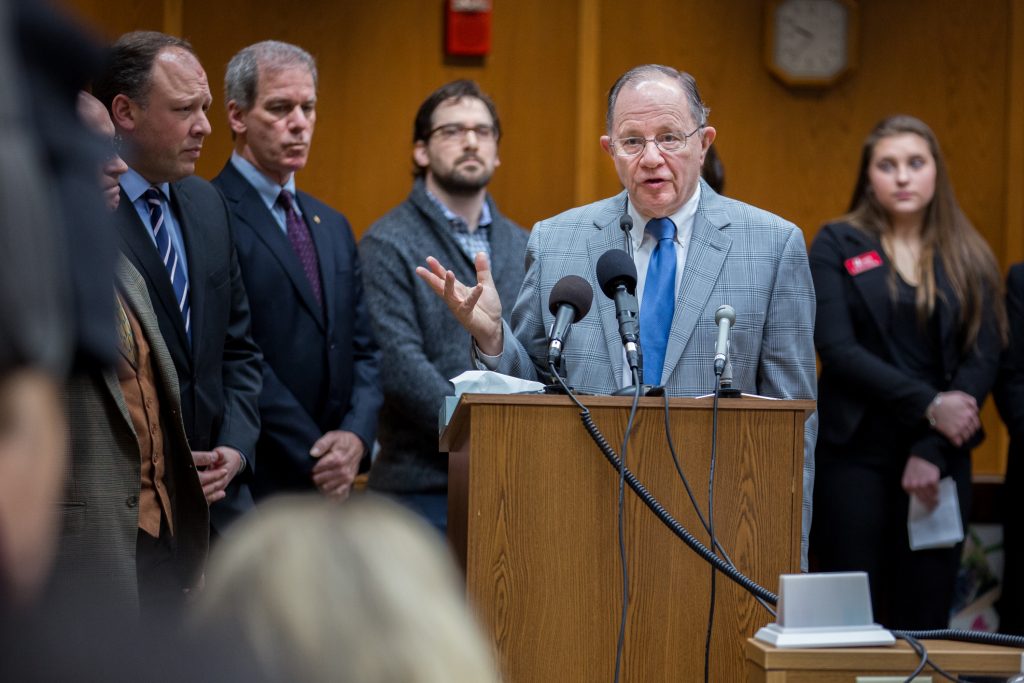The following newsletter was sent to subscribers to Sen. Padden’s newsletter Jan. 18, 2017. To subscribe to Sen. Padden’s newsletters, click here.
Dear friends and neighbors,
On Saturday, the people of our area will pay tribute to one of our best-respected jurists, Sam Cozza, presiding judge of the Spokane County Superior Court. Cozza passed away Jan. 14. I want to add my voice to those who recognize this great loss to our community.
A memorial service is set for 2:30 p.m. Saturday at St. Aloysius Catholic Church, 330 E. Boone Ave., Spokane.
Judge Cozza was a leading member of the bench in Spokane County. I had the pleasure of working with him when we both served as district court judges, before his election to Superior Court in 1996. As chair of the Senate Law and Justice Committee I called upon him on numerous occasions to offer his insight on legal issues. I found his arguments to be well-reasoned and enlightening, just as I enjoyed our many conversations over the last several decades.
Judge Cozza was known for his compassion, his keen intellect, his strict adherence to the law and his scrupulous efforts to be fair to all parties. That respect was shared by all who entered his courtroom. There is no higher tribute that can be paid to someone in his position, and he will be greatly missed.
Another round for tougher felony DUI laws
This year we are making another push to enact tougher DUI laws in this state, and once again it is a matter that deserves the highest level of attention from our state Legislature. We can only hope that this time my fellow lawmakers will give this issue the emphasis it deserves.
Washington has the least-stringent felony DUI law in the country. An offender must be convicted four times of misdemeanor DUI charges within 10 years before prosecutors can charge a felony on the fifth offense, which permits courts to impose a prison sentence upon conviction. Our neighboring states of Idaho and Oregon allow felony charges on the third offense, as do most states, and many states consider DUI convictions over a longer period than 10 years.
Our bill would allow the fourth offense to be charged as a felony. This important reform to our felony DUI law will allow us to remove these impaired drivers from the road for longer periods of time, and reduce the deadly menace of driving under the influence. Repeat drunk drivers and impaired drivers pose the most serious danger of reoffending, and many of the most horrific impaired-driving accidents are caused by repeat offenders. Under this legislation, legislative staff has estimated there would be 276 additional felony prosecutions every year.
This measure has been passed by the Senate unanimously five times since 2015, and the governor has promised to sign the bill when it comes to his desk. Unfortunately, the leaders of the majority Democratic Caucus in the House of Representatives have not allowed the bill to come to the floor of their chamber for a vote. Last year we came very close – the initial budget agreement last year contained funds for increased incarcerations, but the provision was deleted because the bill failed to receive a vote in the House.
This year we are making another effort. Senate Bill 5037 gets its first hearing in the Senate Law and Justice Committee Thursday. Let this be the year the Legislature takes action on this important issue.
A strong message for property rights
We all recognize the right of government to take property for public use, such as roadways or other public amenities, as long as proper compensation is provided. But the propriety of “eminent domain” is far less clear in cases where property is taken for economic development purposes. Although the Washington constitution prohibits government from taking private property for private use, with certain exceptions, for more than 50 years state law has permitted local government authorities to take private property for redevelopment schemes that have essentially the same goal.
This raises serious questions about the abuse of government authority. In a number of cases, private property owners have complained that they have been unable to negotiate their best price when property is taken for economic development purposes. This puts small private landowners at the mercy of local governments that often are dominated by large and politically well-connected commercial interests.
For example, in the Law and Justice Committee this week, we heard testimony from a landowner in the city of Redmond. The city wishes to reroute a stream to her property, essentially rendering that portion unusable, at the behest of six nearby commercial property owners who wish to develop the streambed presently on their property. The landowner maintains the valuation assigned by city officials is too low, but she has only a limited ability to appeal the valuation.
In the wake of a 2005 U.S. Supreme Court decision permitting such practices, some 40 states have enacted legislation to curb the use of eminent domain in cases where there is no direct public benefit. Washington has not. In 2015 I introduced legislation to prohibit the use of eminent domain for purposes of economic development (SB 5363), and this bill passed the Senate twice, making it as far as the House Rules Committee. But it did not receive a vote on the House floor. This year I plan to reintroduce the legislation, and this week’s hearing on the draft version of the bill marks the beginning of the effort. It is time Washington join the many other states that have acted to protect private property owners.













